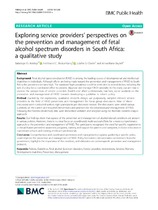| dc.contributor.author | Adebiyi, Babatope O. | |
| dc.contributor.author | Mukumbang, Ferdinand C. | |
| dc.contributor.author | Cloete, Lizahn G. | |
| dc.contributor.author | Beytell, Anna-Marie | |
| dc.date.accessioned | 2018-11-21T06:50:22Z | |
| dc.date.available | 2018-11-21T06:50:22Z | |
| dc.date.issued | 2018 | |
| dc.identifier.citation | Adebiyi, B.O. et al. (2018). Exploring service providers’ perspectives on the prevention and management of fetal alcohol spectrum disorders in South Africa: a qualitative study. BMC Public Health, 18: 1238 | en_US |
| dc.identifier.issn | 1471-2458 | |
| dc.identifier.uri | https://doi.org/10.1186/s12889-018-6126-x | |
| dc.identifier.uri | http://hdl.handle.net/10566/4215 | |
| dc.description.abstract | BACKGROUND: Fetal alcohol spectrum disorder (FASD) is among the leading causes of developmental and intellectual
disabilities in individuals. Although efforts are being made toward the prevention and management of FASD in South
Africa, the prevalence remains high. The sustained high prevalence could be attributed to several factors, including the
lack of policy for a coordinated effort to prevent, diagnose and manage FASD nationally. In this study, our aim was to
explore the perspectives of service providers (health and allied professionals, teachers, social workers) on the
prevention and management of FASD towards developing a guideline to inform policy.
METHOD: Guided by the exploratory qualitative research design, we purposively sampled relevant service
providers in the field of FASD prevention and management for focus group discussions. Nine of these
discussions were conducted with to eight participants per discussion session. The discussants were asked various
questions on the current and required interventions and practices for the prevention and management of FASD.
Following the Framework Method, data were transcribed verbatim and analysed using the thematic content analysis
approach.
RESULTS: Our findings show that aspects of the prevention and management of alcohol-related conditions are present
in various policies. However, there is no clear focus on coordinated, multi-sectoral efforts for a more comprehensive
approach to the prevention and management of FASD. The participants recognized the need for specific requirements
on broad-based preventive awareness programs, training and support for parents and caregivers, inclusive education in
mainstream schools and training of relevant professionals.
CONCLUSION: Comprehensive and coordinated prevention and management programs guided by a specific policy
could improve the prevention and management of FASD. Policy formulation demonstrates commitment from the
government, highlights the importance of the condition, and elaborates on context-specific prevention and management
protocols. | en_US |
| dc.language.iso | en | en_US |
| dc.publisher | BMC | en_US |
| dc.rights | © The Author(s). 2018 Open Access This article is distributed under the terms of the Creative Commons Attribution 4.0
International License (http://creativecommons.org/licenses/by/4.0/), which permits unrestricted use, distribution, and
reproduction in any medium, provided you give appropriate credit to the original author(s) and the source, provide a link to
the Creative Commons license, and indicate if changes were made. The Creative Commons Public Domain Dedication waiver
(http://creativecommons.org/publicdomain/zero/1.0/) applies to the data made available in this article, unless otherwise stated. | |
| dc.subject | Policies | en_US |
| dc.subject | Guidelines | en_US |
| dc.subject | Fetal alcohol Spectrum disorders | en_US |
| dc.subject | Service providers | en_US |
| dc.subject | Interventions | en_US |
| dc.subject | Services | en_US |
| dc.subject | Women | en_US |
| dc.subject | Development disabilities | en_US |
| dc.subject | Prevention | en_US |
| dc.subject | Management | en_US |
| dc.title | Exploring service providers’ perspectives on the prevention and management of fetal alcohol spectrum disorders in South Africa: a qualitative study | en_US |
| dc.type | Article | en_US |
| dc.privacy.showsubmitter | FALSE | |
| dc.status.ispeerreviewed | TRUE | |
| dc.description.accreditation | ISI | |

